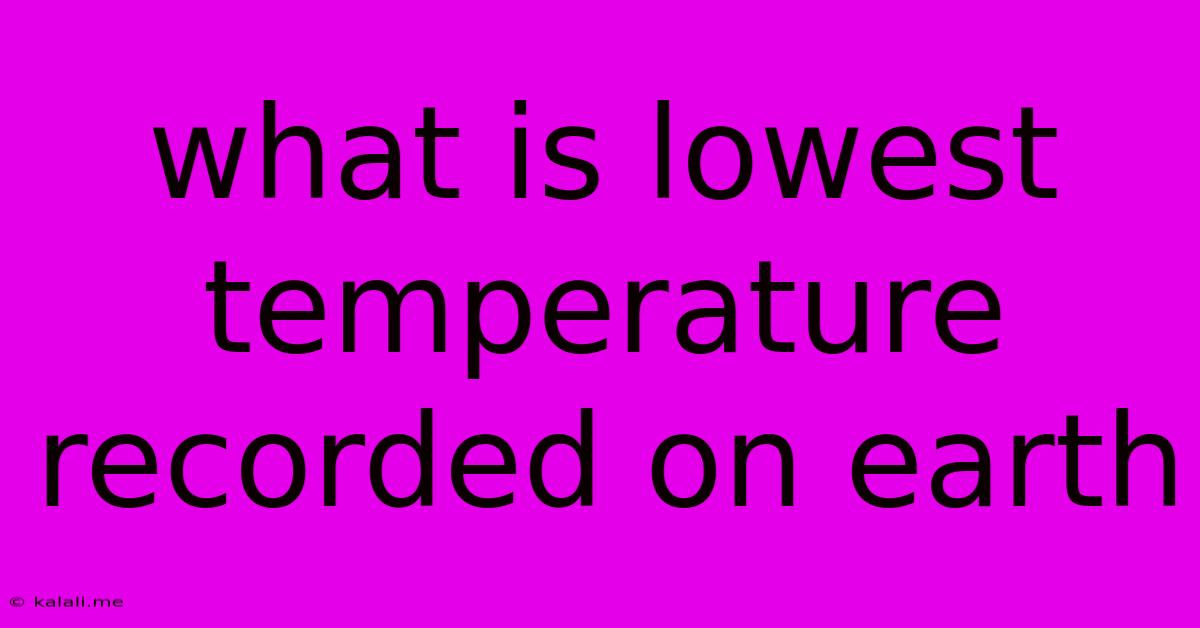What Is Lowest Temperature Recorded On Earth
Kalali
May 30, 2025 · 3 min read

Table of Contents
What is the Lowest Temperature Ever Recorded on Earth? A Deep Dive into Antarctic Extremes
The question of Earth's lowest ever recorded temperature is a fascinating one, leading us to the icy, desolate expanse of Antarctica. While anecdotal evidence suggests even lower temperatures might exist, the officially recognized record stands as a testament to the planet's extreme climatic capabilities. This article delves into the details surrounding this record-breaking chill, exploring the location, the circumstances, and the ongoing quest to understand Earth's coldest corners.
The Record-Breaking Cold: -89.2°C (-128.6°F)
The lowest temperature ever reliably recorded on Earth is -89.2°C (-128.6°F). This frigid mark was measured at the Vostok Station in Antarctica on July 21, 1983. Vostok Station, a Russian research facility located on the East Antarctic Plateau, is situated in one of the coldest, driest, and highest places on the planet. These geographical factors contribute significantly to its extremely low temperatures.
Factors Contributing to Vostok's Extreme Cold
Several factors converge to create the extreme cold at Vostok Station:
-
High Altitude: The station's high altitude (approximately 3,488 meters or 11,444 feet above sea level) plays a significant role. Air pressure decreases with altitude, resulting in less atmospheric insulation and leading to greater heat loss.
-
Polar Location: Vostok's location deep within the Antarctic interior places it far from the moderating influence of oceans. The continent's vast ice sheet acts as a giant heat sink, radiating cold outwards.
-
Clear Skies and Low Humidity: The clear skies above Vostok allow for significant radiative cooling at night. The extremely low humidity prevents the formation of clouds, which would otherwise trap some heat.
-
Katabatic Winds: These strong, downslope winds further contribute to the frigid conditions, sweeping away any relatively warmer air and replacing it with even colder air from the higher elevations.
Beyond Vostok: The Search for Even Lower Temperatures
While -89.2°C is the officially recognized record, scientists believe that even lower temperatures might exist, particularly in the deep interior of the Antarctic Plateau. However, confirming such extreme temperatures requires meticulous measurement and verification. The harsh conditions of Antarctica, including its remoteness and inaccessibility, pose significant challenges to accurate data collection. Furthermore, reliable temperature data collection over extended periods is crucial to establish a definitive record.
The Significance of Extreme Cold Research
Studying these extreme environments provides invaluable insights into a variety of scientific fields:
-
Climate Change Research: Understanding the dynamics of Antarctica’s climate is essential for predicting the impacts of climate change on global weather patterns.
-
Glaciology: The study of glaciers and ice sheets provides insights into past climates and the Earth's history.
-
Astrobiology: The extreme conditions of Antarctica offer a useful analogue for studying the potential for life in extraterrestrial environments.
In conclusion, the -89.2°C recorded at Vostok Station remains the lowest temperature officially recorded on Earth. However, the ongoing research in Antarctica suggests the possibility of even lower temperatures yet to be discovered. This ongoing exploration underscores the importance of continued research in these extreme environments, revealing critical insights into our planet and the universe beyond.
Latest Posts
Latest Posts
-
Error Cannot Open Git Fetch Head Permission Denied
May 31, 2025
-
How To Hide A Dead Body
May 31, 2025
-
How Long Is A Robin Pregnant Before Laying Eggs
May 31, 2025
-
Truck Wont Turn Over No Clicking
May 31, 2025
-
Choose This Day Whom You Shall Serve
May 31, 2025
Related Post
Thank you for visiting our website which covers about What Is Lowest Temperature Recorded On Earth . We hope the information provided has been useful to you. Feel free to contact us if you have any questions or need further assistance. See you next time and don't miss to bookmark.